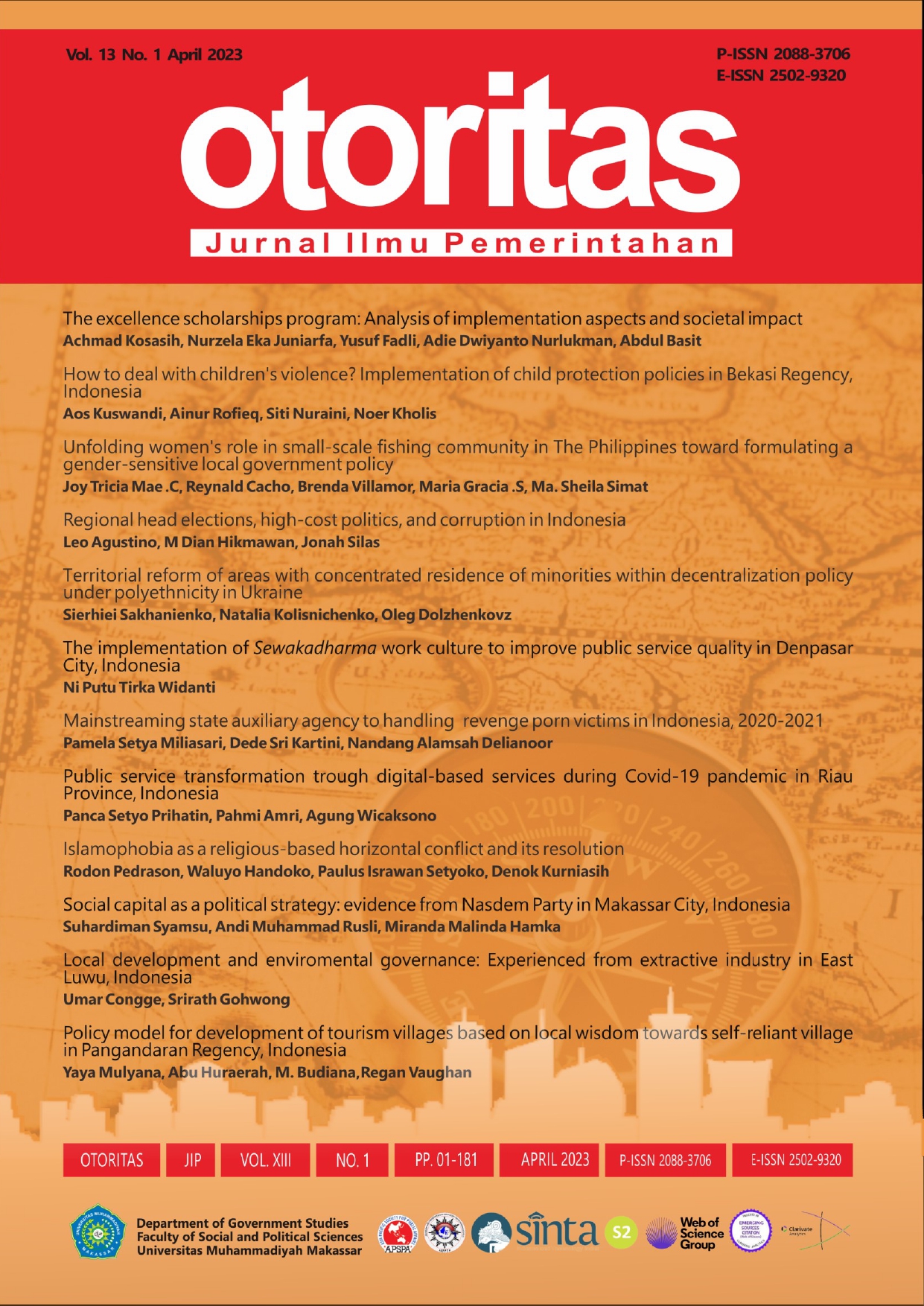Territorial reform of areas with concentrated residence of minorities within decentralization policy under polyethnicity in Ukraine
DOI:
https://doi.org/10.26618/ojip.v13i1.6274Keywords:
decentralization, ethnic policy, ethnic group, ethno-territorial structureAbstract
The ethnic problem is of particular importance with neighboring states, which, as kin-states, seek to protect their diaspora in Ukraine. The purpose of the article is to analyze the results of territorial transformations in the areas of concentrared residence of ethnic minorities in Ukraine and their impact on the current ethno-political balance. To examine the territorial transformations in Ukraine various methods were used - statistical analysis and survey method to generalize the attitude of the population to territorial transformations in the areas of ethnic groups settlements; documentary method to analyse international and Ukraine documents on territorial forming; observation to reveal the minorities moods; content analysis of local governments documents etc. Being based on situational and comparative approaches, on statistical data, the peculiarities of the settlement and administrative structure in areas of concentrated residence of minorities in Ukraine were examined both before the reform of the territorial structure and after the corresponding changes in 2020. On the basis of a wide expert survey, the problematic issues of territorial reform in areas of concentrated residence of minorities were identified, and ways of their solution were proposed. After the analysis of the index of ethnic tolerance in areas of concentrated residence of minorities, a forecast was made about the stability of the territorial structure in areas of concentrated residence of minorities (Romanians and Moldovans), including the mixed (multi-ethnic) municipalities and raions (territorial districts).
References
Anderson, Alan B. 2017. “Ethnic Minorities and Minority Rights in Europe: Theoretical Typologies.” European Centre for Minority Issues–Working Paper (ECMI Working Paper No. 99):1–23.
Blanton, Richard E. 2015. “Theories of Ethnicity and the Dynamics of Ethnic Change in Multiethnic Societies.” Proceedings of the National Academy of Sciences of the United States of America 112(30):9176–81. doi: 10.1073/pnas.1421406112.
Farr, James. 1985. “Situational Analysis: Explanation in Political Science.” The Journal of Politics 47(4):1085–1107. doi: 10.2307/2130808.
Henke, Nina. 2020. “Identity and Nation-Building in Ukraine: Reconciliation of Identities from a Conflict Prevention Perspective.” European Centre For Minority Issues 125(December):1–31.
Hodson, R., D. Sekulic, and G. Massey. 1994. “National Tolerance in the Former Yugoslavia.” American Journal of Sociology 99(6):1534–58. doi: 10.1086/230453.
Hoffmann, Kasper. 2021. “Ethnogovernmentality: The Making of Ethnic Territories and Subjects in Eastern DR Congo.” Geoforum 119:251–67. doi: 10.1016/j.geoforum.2019.10.002.
Kaminsky, Elijah Ben-Zion, and Arend Lijphart. 1980. Democracy in Plural Societies: A Comparative Exploration. Vol. 33. Yale University Press.
Kolodiy, A. 2003. “On the Poly-Ethnicity of Ukraine: Quantitative and Qualitative Dimensions. Ukraine: The Problem of Identity: Human, Economy, Society.” Pp. 239–64 in Conference of Ukrainian alumni of research internship programs of the USA. Kyiv.
Kuchabsky, O. 2010. “The Problem of Ethno-National Autonomy under Administrative-Territorial Reform in Ukraine.” Pp. 166–69 in Public Administration: Theory and Practice.
Maksimovtsova, Ksenia. 2017. “Language Policy in Education in Contemporary Ukraine: A Continuous Discussion of Contested National Identity.” Journal on Ethnopolitics and Minority Issues in Europe 16(3):1–25.
Mc Intosh, Mary E., Martha Abele Mac Iver, Daniel G. Abele, and David B. Nolle. 1995. “Minority Rights and Majority Rule: Ethnic Tolerance in Romania and Bulgaria.” Social Forces 73(3):939–67. doi: 10.1093/sf/73.3.939.
Murphy, A. B. 1989. “Territorial Policies in Multiethnic States.” Geographical Review 79(4):410–21. doi: 10.2307/215115.
Nadolishniy, P. 1998. “Ethno-National Factor of Administrative Reform in Ukraine: Problems of Theory, Methodology, Practice.” P. 264 in UAPA.
Quer, Giovanni M. 2013. “De-Territorializing Minority Rights in Europe: A Look Eastward.” Journal on Ethnopolitics and Minority Issues in Europe 12(1):76–98.
Safran, William. 2014. “Spatial and Functional Dimensions of Autonomy: Cross-National and Theoretical Perspectives.” Identity and Territorial Autonomy in Plural Societies 5(3–4):11–34.
Serhiey, Sakhanienko, Nadolishniy Petro, and Kolisnichenko Natalia. 2017. “Consolidation of Territorial Communities under the Conditions of Multi-Ethnicity in the South of Odessa Oblast.” Cross-Border Journal for International Studies (4).
Smith, David J., and Mariana Semenyshyn. 2016. “Territorial-Administrative Decentralisation and Ethno-Cultural Diversity in Ukraine: Addressing Hungarian Autonomy Claims in Zakarpattya.” (November).
Solonenko, I. 2017. “Policy and Legislative Challenges to Non-Discrimination, Minority Protection and Diversity Issues in Ukraine.” ECMI Study.
Sweet, S. S. 1984. Imagined Communities: Reflections on the Origin and Spread of Nationalism. Vol. 1984. Verso books.
Tiryakian, Edward A., and Walker Connor. 1995. Ethnonationalism: The Quest for Understanding. Vol. 24. Princeton University Press.
Downloads
Published
Issue
Section
License
The Editorial Team of Otoritas: Jurnal Ilmu Pemerintahan reserves the right to transfer the copyright of the article once it has been accepted and a decision has been made to publish it.
Department of Government Studies, Faculty of Social and Political Sciences, Universitas Muhammadiyah Makassar in collaboration with Muhammadiyah’s College Association of Government Studies (AIPPTM) and Asia Pacific Society for Public Affairs (APSPA) as the publisher of Otoritas: Jurnal Ilmu Pemerintahan holds the copyright of all articles published in this journal.
The Publisher holds the right to reproduce and distribute the article and author is not allowed to publish the same article published in this journal.
Statement of Authenticity and Manuscript Copyright can be downloaded: here
After filling in the statement letter, please send via e-mail: otoritas@unismuh.ac.id






